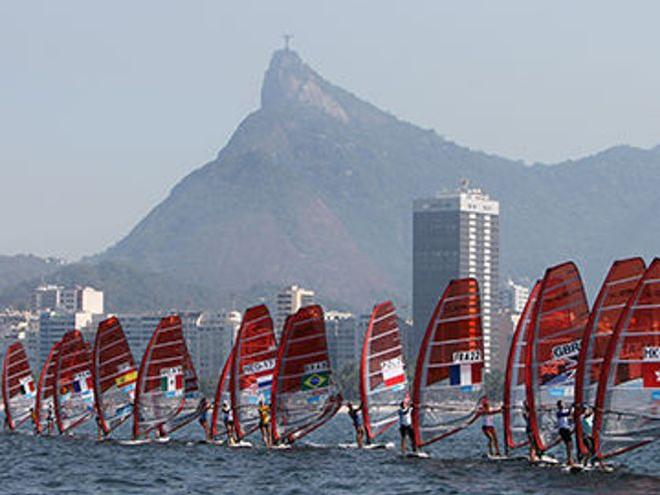Rio Olympics 2016 - ISAF discusses pollution concerns with IOC
by Nick Butler - insidethegames.biz, sailing.org on 10 Mar 2015

Women's RSX fleet - ISAF ISAF
As Rio 2016 Olympic Sailing Competition is due to be held in Brazil, ISAF President Carlo Croce and ISAF Vice-President Scott Perry visited the International Olympic Committee (IOC) on Friday 6 March where they met with IOC President Thomas Bach and members of the IOC staff to discuss the shared concern about pollution in Guanabara Bay, Rio de Janeiro.
The concern of both the IOC and ISAF centres mainly on the physical objects in the water which can affect the outcome of competition and the contamination of the water which can affect the health of the competitors.
Both the IOC and ISAF are determined that no effort should be spared in addressing both these problems. Representatives of ISAF will be in Rio during the week of 9 March to determine what steps are being taken by the relevant Brazilian authorities to deal with this urgent matter.
Project Guanabara Limpa
Rubbish littering Guanabara Bay will have been reduced well before Olympic and Paralympic sailing competitions take place, an official from a Dutch Research Institute supporting Rio State authorities has claimed, although work has currently been suspended due to a lack of boats.
Joao de Lima Rego, a marine coastal system's adviser for Deltares, the institute employed by the Dutch Government as part of a collaboration with Rio de Janeiro authorities, has put in place a simulation predicting precisely where rubbish is likely to accumulate.
By compiling four-day forecasts of three-dimensional currents and concentrations of
pollution in the bay, collectors can then target specific areas - either with boats or by constructing eco-barriers - thus increasing both efficiency and cost-effectiveness.
This system, installed over the last four months, has analysed the 18 rivers leading into the Bay and is now due to be in operation for a two-year period running until March 2017.
'The debris in the Bay is the first and foremost priority, closely followed by dealing with the sewage, which comes from raw materials,' Rego told insidethegames today.
'We have devised a high quality modelling system in order to reduce levels.
'Everything is relative, but, yes, it will reduce levels.'
This comes as pollution at the venue continues to be one of the biggest concerns overshadowing preparations, with much criticism from athletes as well as officials.
Organisers have repeatedly attempted to reassure the International Olympic Committee (IOC) that the Bay will be safe to compete in during the Games.
This international involvement will come as some reassurance but the effort is being hampered by lack of resources.
There have been no ecoboats in operation for the last two weeks due to delays in agreeing a contract to purchase them, as well as delays in dealing with the graver longer term issue of sewage build-up.
A meeting took place earlier this month between the IOC and the International Sailing Federation earlier to discuss solutions, after which both reiterated how 'no effort should be spared in addressing both these problems'.
The next challenge will come from August 8 to 18, when a second sailing test event is scheduled to take place on the Bay.
Rio's State Government, who are responsible for pollution concerns, are yet to respond to insidethegames' requests for a comment on when new boats are likely to be purchased.
Rio 2016 Olympic Sailing Competition
The Rio 2016 Olympic Sailing Competition will take place at the Marina da Glória, Rio de Janeiro, Brazil and will feature 380 athletes competing across ten events.
Racing is scheduled to take place from 8-18 August 2016 and the competition format for all events is fleet racing.
If you want to link to this article then please use this URL: www.sail-world.com/132313